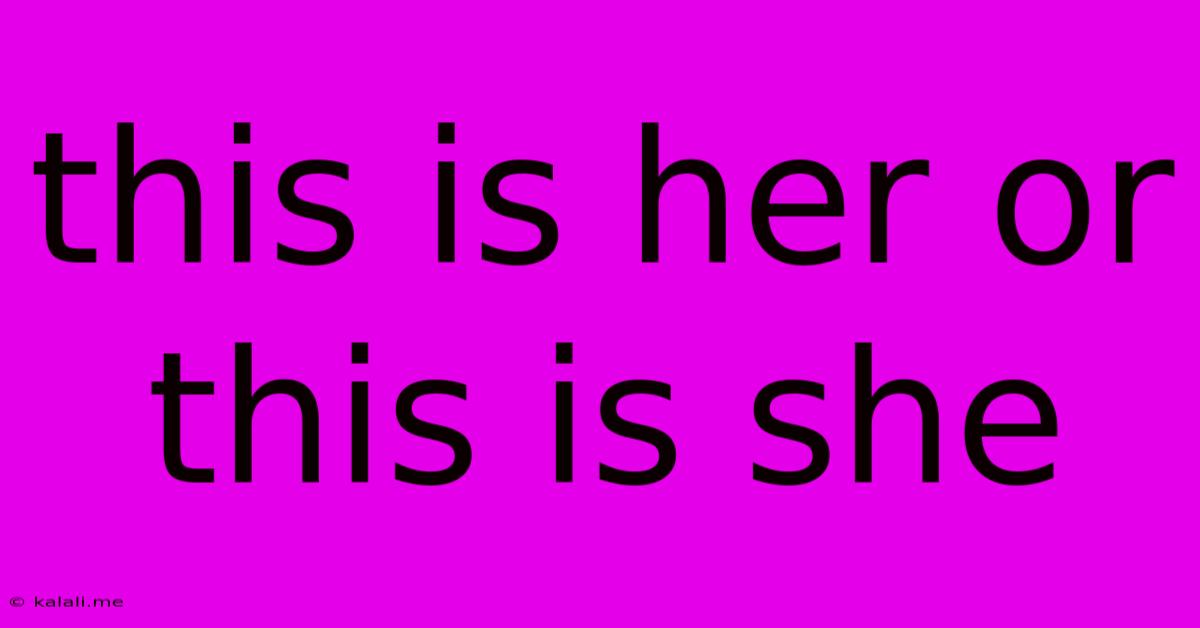This Is Her Or This Is She
Kalali
Jun 03, 2025 · 3 min read

Table of Contents
This Is Her vs. This Is She: Mastering the Subtleties of Pronoun Usage
Choosing between "this is her" and "this is she" often trips up even seasoned writers. The difference lies not in meaning, but in grammar – specifically, the use of subjective versus objective pronouns. This article will delve into the nuances of these phrases, clarifying when to use each and providing examples to solidify your understanding. Understanding this distinction will elevate your writing, making it more grammatically correct and sophisticated.
Understanding Subjective and Objective Pronouns
The core of the issue lies in understanding the grammatical roles of pronouns. Pronouns substitute for nouns, and they have different forms depending on their function in a sentence.
-
Subjective pronouns (also called nominative pronouns) act as the subject of a verb. They perform the action. Examples include I, you, he, she, it, we, they.
-
Objective pronouns act as the object of a verb or a preposition. They receive the action. Examples include me, you, him, her, it, us, them.
"This Is She" – The Formal Choice
The phrase "this is she" uses the subjective pronoun "she" because "she" is the subject of the verb "is." This construction is considered more formal and grammatically correct in situations where a pronoun follows a linking verb like "is," "are," "was," "were," etc. The linking verb connects the subject ("this," which represents a person) to a predicate nominative ("she").
Examples:
- "Is that Mary on the phone?" "This is she."
- "Who's at the door?" "This is she."
- "The winner of the competition is she."
"This Is Her" – The Informal Choice
"This is her" utilizes the objective pronoun "her." While grammatically incorrect in the strict sense described above, it's commonly used in informal speech and writing. It’s less formal and sounds more natural in everyday conversation. The use of "her" in this context is often considered a colloquialism.
Examples:
- "Is that your sister?" "Yeah, this is her."
- "Who's calling?" "This is her."
When to Use Which?
The choice between "this is she" and "this is her" depends largely on context and desired tone.
-
Formal writing and situations: Always opt for "this is she." Think formal letters, academic papers, and professional communications.
-
Informal conversations and writing: "This is her" is perfectly acceptable and even sounds more natural. This includes emails to friends, casual texts, and informal blog posts.
Beyond "This Is": Applying the Rule
The same grammatical principles apply to similar constructions:
-
"It is I" vs. "It is me": "It is I" is grammatically correct (subjective pronoun), but "It is me" is more common in informal settings (objective pronoun).
-
"That's him" vs. "That's he": "That's him" is generally preferred in modern usage, although "That's he" is grammatically correct.
Conclusion
Mastering the difference between "this is her" and "this is she" allows for greater precision and sophistication in your writing. While both are used, understanding their grammatical implications helps you choose the most appropriate option depending on the context and your desired level of formality. By understanding the roles of subjective and objective pronouns, you can confidently navigate these nuances and elevate your communication skills.
Latest Posts
Latest Posts
-
Does God Choose Who Will Be A Bloodstopper
Jun 04, 2025
-
Nexus Mod Manager Fnv Not Working
Jun 04, 2025
-
Why Is My Exhaust Leaking Water
Jun 04, 2025
-
Open A Garage Door From The Outside
Jun 04, 2025
-
How To Apply A Screen Protector Without Air Bubbles
Jun 04, 2025
Related Post
Thank you for visiting our website which covers about This Is Her Or This Is She . We hope the information provided has been useful to you. Feel free to contact us if you have any questions or need further assistance. See you next time and don't miss to bookmark.